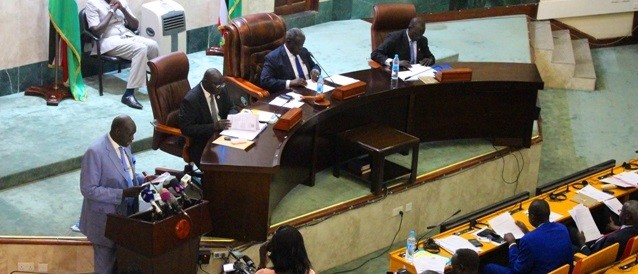Less than two thirds of South Sudanese parliament members today voted to approve constitutional amendments to create 28 new states, creating uncertainty about the future of President Salva Kiir’s plan to sub-divide the existing 10 states along ethnic lines.
The parliament had been asked to amend articles 162, 164 and 165 of the constitution, as well as the provision which limits the number of states of the republic to only ten.
According to the National Legislative Assembly (NLA) Speaker Manasseh Magok, the total number of MPs present today was 189 only. “I’m duly informed that the NLA quorum is 189,” he said.
Article 197 of the constitution says that it may not be amended unless by a vote of “two-thirds of all members of each House of the National Legislature sitting separately.”
The parliament has 332 seats but some members have been dismissed or have died and the number remaining as active members is not less than 297. This means that 198 of 297 members would need to vote in favor of the amendments in order to reach the required two-thirds majority.
Not enough NLA members were therefore present in the assembly today to secure a 2/3 vote in favour of the measures for creating 28 states as proposed by the president.
Minority Leader Onyoti Adigo said after the assembly sitting today, “According to the constitution there must be two-thirds to change the constitution… after we walked out there were less than 183.”
However, proponents of the constitutional amendments have claimed a victory in the assembly sitting today, tallying the 189 NLA members together with 39 Council of States members, though the constitution says that the two houses shall sit separately when considering constitutional amendments.
A number of South Sudanese media houses after the vote reported that the amendments were approved.
Speaker Manasseh Magok said to MPs, “I thank you very much for passing this, although your opponents may be lying and they should actually see your number… we have passed this with the two-thirds NLA and two-thirds council of states unanimously.”
Minority Leader Onyoti Adigo rejected this saying, “The attendance which was announced by the speaker is 189 NLA, and 39 Council of states… what the parliament is doing is unconstitutional and that is why they didn’t count how many people voted in favor of amending this constitution because they are afraid.”
Attendance rolls for the assembly session have not been released, nor has a formal vote count.
Prior to the meeting, SPLM-DC politicians had announced their opposition to the amendments and several SPLM politicians had also expressed concerns, including some members of the Equatorian Caucus and local politicians from parts of Western Bahr al Ghazal. Governors of Jonglei and WBEG had expressed mixed views on the proposal.
The MPs from Western Bahr al Ghazal had not announced a political position prior to the vote today and it is not clear whether they voted for the bill or boycotted the session. A statement attributed to the “Nuer Parliamentary Caucus” today announced opposition to the amendments, but its veracity could not be immediately verified.
In a similarly controversial vote last year, a block of ruling party MPs from Equatoria boycotted a sitting in which other ruling party MPs voted to approve the National Security Service bill. Nobody voted against the motion but enough MPs boycotted the session to prevent a quorum from being reached.
Today’s vote marks the culmination of more than a month of debate about the creation of 28 states since Salva Kiir issued a surprise decree on 2 October, known as the ‘Establishment Order’. The president’s information minister initially said that the ‘administrative’ decree would take effect without approval by parliament, but later they reversed this position and decided to take the decree to parliament for approval as a constitutional amendment.




